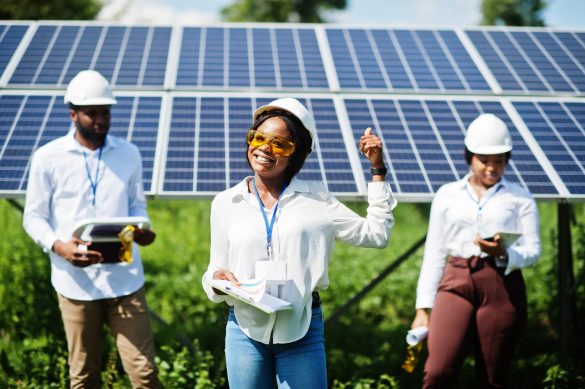The US Agency for International Development (USAID) and Power Africa unveiled the “Growing Green Jobs for Women in Nigeria” campaign. Importantly, this new initiative champions renewable energy. Additionally, it seeks to further gender equality and invigorate the green energy sector.
At the project’s heart is a plan to train nearly 500 women and young individuals. So, what’s the end game? To adequately prepare them for success in Nigeria’s dynamic energy sector.
Diving into the past, a clear gender gap emerges in Nigeria’s energy roles. The 2022 Powering Jobs Census expressly confirms this disparity. Whereas women claim just 8% of STEM positions, they overwhelmingly populate 64% of non-STEM jobs.
Zooming out to a broader perspective, the International Renewable Energy Agency’s (IRENA) 2023 Annual Review provides enlightening data. Astonishingly, global employment in renewable energy spiked to 13.7 million in 2022, up from 7.3 million a decade earlier. As investments in green energy surge, IRENA underlines the urgency of an inclusive energy transition. Consequently, there’s a push to bolster education, amplify training, and pave youth-centered career pathways. Not to mention, special attention is directed towards minorities and traditionally overlooked groups.
Yet, despite progress, a gender imbalance persists in renewable energy roles. However, a glimmer of hope shines through IRENA’s findings. Within solar technology, the scales tip towards balance, with women holding about 40% of jobs, as reported by ESI Africa.
In light of this, Power Africa’s initiative stands out. Aligned with Nigeria’s green vision, it’s poised to offer Nigerian women and youth a rich blend of learning tools. Therefore, they’re positioned to thrive in a competitive energy landscape.
How will this transformative agenda unfold? Firstly, it promises specialised training spanning areas from solar installation to communication. Secondly, it accentuates the value of hands-on exposure. Lastly, and crucially, mentorship is woven into its fabric.
Offering a panoramic view, Susan Oranye from USAID/Nigeria elucidates. She emphasises, “Nigeria’s visionary Energy Transition Plan aims for net-zero emissions by 2060. Simultaneously, the goal is to lift 100 million citizens out of energy poverty. Projecting forward to 2060, the power sector might burgeon, adding a whopping 420,000 roles. Thus, the stage is set for women to redraw their boundaries in a traditionally male-centric realm.”
Beyond its structured framework, the “Growing Green Jobs for Women” initiative stands as a testament to commitment. Its aims are multifold: to elevate women and marginalised groups in Nigeria’s clean energy transition, bolster access to resources, shatter gender barriers, and cultivate an equitable energy culture. Moreover, there’s a concerted push to pivot away from fossil fuels.
As Nigeria embarks on this green journey, the world, in anticipation, keenly observes. Could this pioneering endeavour inspire a ripple effect, nudging other nations towards a greener horizon? Only time will reveal.



